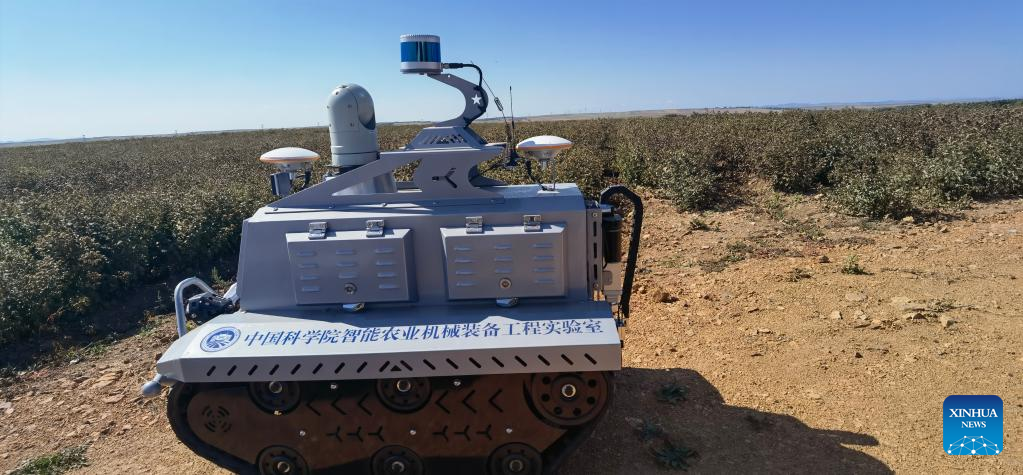China Upgrades Farming Technology to Protect Black Soil
time:2022-11-17author:母基金source:本站click:807
 This photo taken on Sept. 16, 2022 shows a soil testing robot in the Dahewan Demonstration Zone in Hulun Buir City of north China's Inner Mongolia Autonomous Region. (Xinhua/Zou Jianpu)
This photo taken on Sept. 16, 2022 shows a soil testing robot in the Dahewan Demonstration Zone in Hulun Buir City of north China's Inner Mongolia Autonomous Region. (Xinhua/Zou Jianpu)
An unmanned tractor shuttles back and forth, harrowing a field where soybeans were just harvested in north China's Inner Mongolia Autonomous Region.
The tractor boasts a power of 300 kW to lift a rake of 9 meters wide for plowing the soil, while it is not just a piece of electric plowing equipment, said Chen Haihua, one of its developers and senior engineer of the Chinese Academy of Sciences, which is leading the agricultural innovation program.
Chen said the multifunctional tractor can collect data on the soil and crops during the farming process, including planting and harvesting.
The intelligent farming assisted with smart agricultural machinery and equipment linked with satellites as well as unmanned aerial vehicles and ground sensors is piloted in the Dahewan Demonstration Zone in Hulun Buir City.
In addition to the tractor, several soil testing robots patrol the field, examining the soil substances and sending data to operators.
"Compared with traditional agricultural machinery, the intelligent farming tools are more like a combination of computers, mobile phones, and smart agricultural machinery," Chen said, adding that the command center of the intelligent farming system can automatically conduct analysis and modeling based on the collected data, and establish electronic files for the black soil.
The pilot zone of 11,200 hectares mainly cultivates soybeans. It is one of the important black soil areas in China.
The black soil, or chernozem soil, found in China's northeastern provinces of Heilongjiang, Jilin, and Liaoning and in some parts of the Inner Mongolia Autonomous Region, produces about a quarter of the country's total grain output, making it crucial to China's food supply.
According to the ecological monitoring, the black soil in Dahewan is on the verge of wind and water erosion, with decreasing organic matter imperiling the fertility of the fields.
Zhang Yucheng, a senior engineer at the Institute of Computing Technology, Chinese Academy of Sciences, said the institute launched the "Black Soil Granary" program in July 2021 for black soil conservation and modern agricultural development.
"We are developing technology that can protect the soil without reducing the crop yield," he said.
According to the program's objectives, in the next five years, the soil quality in 2,000 hectares of the core area in Dahewan will be improved while the comprehensive economic benefit of the field increases by more than 10 percent. Human labor will be reduced by more than 50 percent in a 333-hectare area in the demonstration zone.
"Under the premise of cost saving, efficiency, and quality improvement, the program's research fruit will be promoted in all of the country's black soil areas," he said. (Xinhua)

This photo taken on Sept. 16, 2022 shows an unmanned tractor in the Dahewan Demonstration Zone in Hulun Buir City of north China's Inner Mongolia Autonomous Region. (Xinhua/Zou Jianpu)

